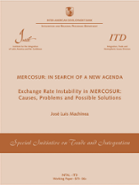Exchange Rate Instability in MERCOSUR: Causes, Problems and Possible Solutions
Date
Jul 2004
EDITOR
INTAL
This paper formed part of a Conference "Mercosur: In Search of a New Agenda" held in the Getulio Vargas Foundation in Rio de Janeiro in June 2003. The purpose of the Conference was to was to examine future directions for Mercosur in light of emerging political dynamics pointing to renewed interest in deepening the initiative after a turbulent 1999-2002. The papers and the conference were supported by the Integration and Regional Programs Department of the Inter-American Development Bank through its Special Initiative on Trade and Integration. The Department is grateful for the collaboration of the Foundation and in particular to Professor Renato Flores. Taking into account the relevancy of exchange variability for integration agreements, this paper evaluates the importance of exchange volatility among member countries of a free trade area and some possible solutions. Measures to prevent or reduce these fluctuations in terms of macroeconomic policy coordination are also examined. Additionally, the creation of a monetary union within MERCOSUR, macroeconomic policy coordination, and a compensation mechanism to tackle exchange variability are also analyzed. Most relevant elements to advance in macroeconomic cooperation in MERCOSUR are studied, and an assessment is made of how exchange variability could be reduced, should exchange regimes be excluded from this coordination.



